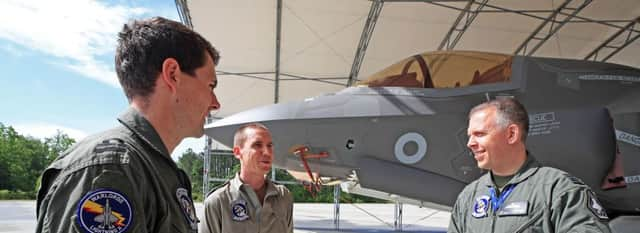Armed Forces Minister hints at payrise for service personnel


The move could see pay rises for tens of thousands of personnel – but is estimated it would cost hundreds of millions of pounds.
The minister suggested that the country would have to spend “north of 2.5 per cent” of gross domestic product (GDP) in order to pay for increased salaries and new jets, warships and other equipment.
Advertisement
Hide AdAdvertisement
Hide AdStarting salary for a private in the Army is £18,488 a year, while a sergeant makes at least £33,490 a year. After 26 weeks’ training, a Royal Navy seaman earns £18,000 per year.
The independent body that advises the government on pay for members of the Army, Navy and RAF has provided its recommendations for the 2018-19 pay round.
The Ministry of Defence (MoD) said an announcement on the issue would be made in due course, but it was reported yesterday that the body has recommended an increase of about 3 per cent.
The government announced in September that it was lifting the 1 per cent public sector pay cap, which has been in place since 2010, saying it “recognised in some parts of the public sector, especially in areas of skill shortage, more flexibility may be required to deliver word-class public services.”
However, an announcement on how armed forces pay may change was delayed.
Mr Ellwood, a former Army captain, said that while people do not join the armed forces “for the money as such”, pay must not become a reason “as to why they would be deterred from it”.
He added: “There needs to be a pay rise. We have still got to conclude the defence modernisation programme, but you would need to move north of 2.5 per cent to make any of this work, if you want to retain the same defence posture given the dangers, the complexities of the world that we face.”
Labour shadow defence secretary Nia Griffith has said the military faces “a real crisis in recruitment and retention across all three services” because of pay restraint.
Advertisement
Hide AdAdvertisement
Hide AdMr Ellwood has previously suggested the armed forces should receive funding on a par with the NHS.
Latest figures from the Office for National Statistics show the UK spent 9.8 per cent of gross domestic product (GDP) on healthcare in 2016.
On Friday, Defence Secretary Gavin Williamson warned that Britain must continue to invest in its conventional armed forces if it is to deter aggressors such as a resurgent Russia.
In comments likely to be seen as aimed at Chancellor Philip Hammond, he said investing in the military was about “making sure things do not happen”.
The MoD is said to be facing a budgetary black hole of at least £20 billion over the next decade.
Malcolm Chalmers, deputy director-general at defence think-tank the Royal United Services Institute, said a 3 per cent increase would cost around £200 million a year.
If Mr Hammond declines to give the MoD more money to pay for increased salaries, this would have to come from the department’s own stretched budget.
An MoD spokesman said: “An announcement will be made in due course.”